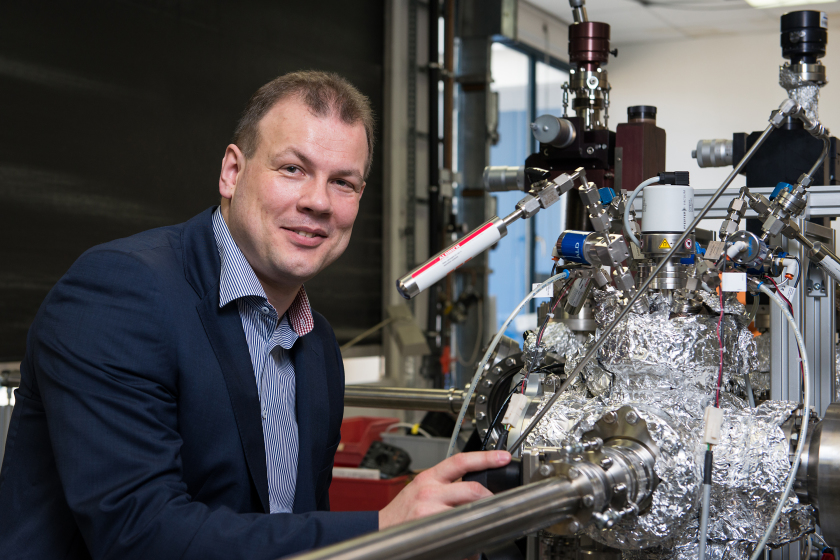PECDEMO: sunlight to hydrogen

Roel van de Krol, head of the HZB Institute for Solar Fuels, coordinates the global research project PECDEMO.Photo: P.Dera/HZB
Within just three years, research partners of the EU project PECDEMO are planning on developing a practical system capable of converting over eight percent of solar energy into hydrogen. This could prove a real breakthrough in terms of practical applicability. Roel van de Krol, head of the HZB Institute for Solar Fuels, coordinates this global research project.
The official start date is set for April. The research partners will have but three years to realize their self-defined goal – a feat that is both ambitious and tangible. Together, they plan on coming up with a material system capable of converting eight percent of irradiated solar energy into hydrogen. In addition, this material system should be able to cover an area of 50 square centimeters while maintaining stability for more than a thousand hours.
“Obviously we’re taking a real chance by so explicitly defining such a specific goal,” says Prof. Dr. Roel van de Krol, the EU project’s coordinator. “But given the rapid progress we’ve made over the past five years, we’re confident we can do it. The larger area is meant to demonstrate that these types of systems don’t just work only in the lab but that they can also be upscaled to hold relevance for real-world applications.” For smaller areas, the partners are even planning on upping efficiency to ten percent.
For the PECDEMO project, van de Krol has successfully secured the talents of several renowned partners: PVcomB and DLR, Michael Graetzel’s team at the Ecole Polytechnique Fédérale de Lausanne, Switzerland, the Israel Institute of Technology in Haifa, Israel, as well as the University of Portugal. Partners from industry include EVONIK Industries and Solaronix SA. In all, PECDEMO has been granted funding totaling 1,83 million Euros for a three year period, of which the HZB will be receiving 440,000 Euros.
arö
https://www.helmholtz-berlin.de/pubbin/news_seite?nid=13953;sprache=en
- Copy link
-
Sodium-ion batteries: New storage mechanism for cathode materials
Li-ion and Na-ion batteries operate through a process called intercalation, where ions are stored and exchanged between two chemically different electrodes. In contrast, co-intercalation, a process in which both ions and solvent molecules are stored simultaneously, has traditionally been considered undesirable due to its tendency to cause rapid battery failure. Against this traditional view, an international research team led by Philipp Adelhelm has now demonstrated that co-intercalation can be a reversible and fast process for cathode materials in Na-ion batteries. The approach of jointly storing ions and solvents in cathode materials provides a new handle for the designing batteries with high efficiency and fast charging capabilities. The results are published in Nature Materials.
-
New Helmholtz Young Investigator Group at HZB on perovskite solar cells
Silvia Mariotti starts building up the new Helmholtz Young Investigator Group ‘Perovskite-based multi-junction solar cells’. The perovskite expert, who was previously based at Okinawa University in Japan, aims to advance the development of multi-junction solar cells made from different perovskite layers.
-
Hydrogen storage in MXene: It all depends on diffusion processes
Two-dimensional (2D) materials such as MXene are of great interest for hydrogen storage. An expert from HZB has investigated the diffusion of hydrogen in MXene using density functional theory. This modelling provides valuable insights into the key diffusion mechanisms and hydrogen's interaction with Ti₃C₂ MXene, offering a solid foundation for further experimental research.
